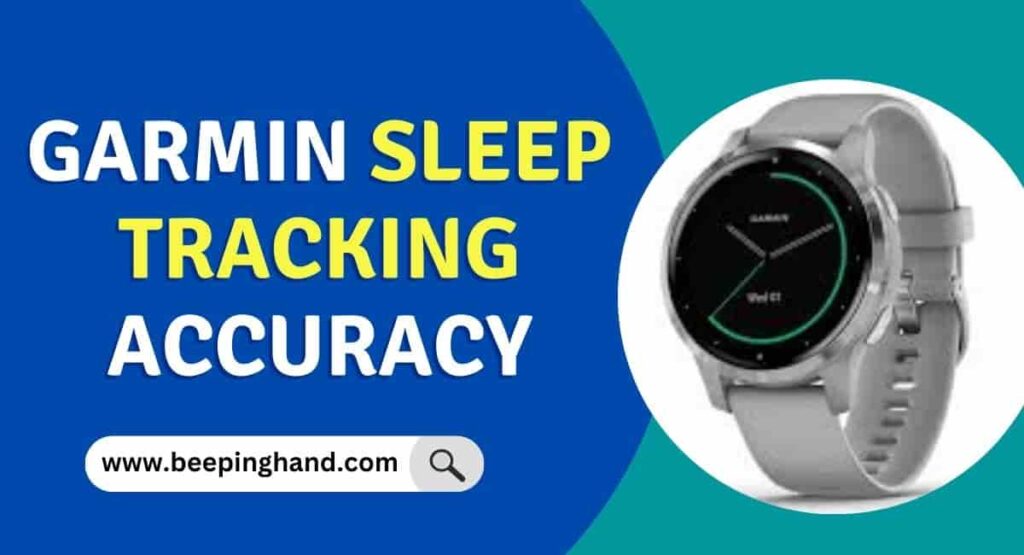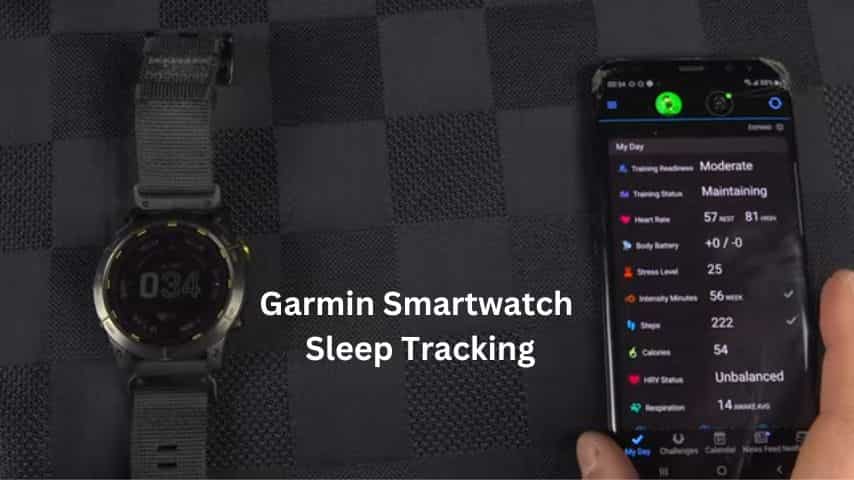Garmin is one of the most well-known and trusted brands when it comes to fitness and wellness devices. One of the features that Garmin devices offer is sleep tracking. Sleep tracking has become increasingly popular in recent years, as people have become more aware of the importance of good quality sleep for overall health and well-being.
However, one question that often comes up is how accurate is Garmin sleep tracking. In this blog post, we will explore Garmin Sleep Tracking Accuracy and what factors can affect its accuracy. So, you may read this article.
Garmin Sleep Tracking Accuracy

If you are wondering to know how accurate Garmin sleep tracking is? then you have come to the right place. We’ve shared complete details here.
What is Garmin Sleep Tracking?
Garmin sleep tracking is a feature that is available on many of its devices, including smartwatches, fitness trackers, and other wearable devices. The feature uses sensors on the device to track your movements during the night and determine how much time you spend in different sleep stages. This information is then used to provide a sleep score and insights into the quality of your sleep.
Garmin sleep tracking can provide information on:
- Total sleep time
- Deep sleep time
- Light sleep time
- REM (Rapid Eye Movement) sleep time
- Awake time
- Sleep stages throughout the night
Garmin devices use a combination of sensors, including an accelerometer and heart rate monitor, to track your movements and heart rate during the night. This data is then analyzed by the device’s algorithms to determine which sleep stage you are in.
Read more: How to Reset Garmin Watch
How Accurate is Garmin Sleep Tracking?
Garmin sleep tracking is generally considered to be accurate, but like any sleep tracking technology, it is not perfect. The accuracy of Garmin sleep tracking can be affected by various factors, such as the type of device you are using, the placement of the device on your wrist, and the quality of the sensors.
Overall, Garmin sleep tracking is considered to be accurate enough to provide useful insights into the quality of your sleep. However, it is important to remember that no sleep-tracking device is 100% accurate and that other factors, such as stress and environmental factors, can also affect the quality of your sleep.
Factors That Can Affect Garmin Sleep Tracking Accuracy
Device placement – The placement of your Garmin device on your wrist can affect the accuracy of sleep tracking. For best results, the device should be snug but not too tight, and positioned on the top of your wrist, with the display facing upwards.
Sleep Position – Your sleep position can also affect the accuracy of Garmin sleep tracking. If you move around a lot during the night or sleep on your stomach, the device may have a harder time accurately tracking your movements.
Environmental Factors – Environmental factors, such as temperature and noise levels, can also affect the quality of your sleep and the accuracy of sleep tracking. For example, if you sleep in a noisy environment, the device may mistake the noise for movement.
Health Conditions – Certain health conditions, such as sleep apnea and insomnia, can affect the quality of your sleep and the accuracy of sleep tracking. If you have a sleep disorder, it is important to work with a healthcare professional to manage your condition.
Tips for Improving Garmin Sleep Tracking Accuracy
Wear the device correctly – Make sure you are wearing your Garmin device correctly and that it is snug but not too tight. Position the device on the top of your wrist
Keep your device charged – Make sure your device is fully charged before going to bed. Low battery levels can affect the accuracy of sleep tracking.
Avoid Caffeine and Alcohol – Caffeine and alcohol can affect the quality of your sleep and make it harder for the device to accurately track your movements. Avoid consuming these substances before bedtime.
Establish a Consistent Sleep Routine – Establishing a consistent sleep routine can help improve the accuracy of sleep tracking. Try to go to bed and wake up at the same time every day.
Use multiple data sources – Using multiple data sources, such as a sleep diary and a sleep tracking app, can help provide a more accurate picture of your sleep patterns.
Also Read: Best Garmin Watch in 2023
Garmin Fenix 6 Sleep Tracking Accuracy

The Garmin Fenix 6 is one of the most advanced fitness and wellness devices on the market, with a range of features that include sleep tracking. Like other Garmin devices, the Fenix 6 uses sensors such as an accelerometer and heart rate monitor to track your movements and heart rate during the night. The device then uses advanced algorithms to analyze this data and determine which sleep stage you are in.
While the accuracy of Garmin sleep tracking can vary depending on various factors, studies have shown that the Garmin Fenix 6 is generally considered to be accurate in detecting sleep duration, sleep onset, and wake time, as well as the overall quality of sleep. For example, a study published in the Journal of Sleep Research found that the Fenix 6 was accurate in detecting total sleep time, light sleep, deep sleep, and REM sleep.
Read more: Garmin Forerunner Heart Rate Accuracy
Wrapping Up
This article is all about Garmin Sleep Tracking Accuracy. Garmin sleep tracking provides users with valuable insights into their sleep patterns and duration. While it may not be 100% accurate in distinguishing between sleep stages or capturing every moment of wakefulness, it offers a general overview of sleep quality.
If you still have any queries then you may ask in the comment box. We have also written a proper guide on Restart Garmin Watch. You can also check more on Garmin App
FAQ’s Garmin Sleep Tracking Accuracy
How does Garmin sleep tracking work?
Garmin sleep tracking uses sensors such as an accelerometer and heart rate monitor to track your movements and heart rate during the night. The device then uses advanced algorithms to analyze this data and determine which sleep stage you are in.
How accurate is Garmin sleep tracking?
Garmin sleep tracking is generally considered to be accurate in detecting sleep duration, sleep onset, and wake time, as well as the overall quality of sleep. However, no sleep tracking technology is 100% accurate, and the accuracy of Garmin sleep tracking can be affected by various factors such as the placement of the device on your wrist, your sleep position, and environmental factors such as temperature and noise levels.
Can I wear my Garmin device on my ankle for sleep tracking?
While some Garmin devices can be worn on the ankle, it is recommended that you wear the device on your wrist for sleep tracking. Wearing the device on your ankle can affect the accuracy of sleep tracking.
Can I improve the accuracy of Garmin sleep tracking?
Yes, you can improve the accuracy of Garmin sleep tracking by wearing the device correctly, keeping it charged, and establishing a consistent sleep routine. Using multiple data sources, such as a sleep diary, can also help provide a more accurate picture of your sleep patterns.
I have the Venu 2 plus and apparently I was light sleeping whilst on a night flight ✈️ last Sunday despite the fact that I was reading , eating and chatting for the entire flight . Do I need to be changing my watching settings to reflect actual sleep more accurately?
Some smartwatches allow you to customize sleep settings. Check if your smartwatch has specific options for different sleep modes or airplane travel. You can enable or disable these features based on your preferences.
I own an Instinct2 and don’t believe the sleep tracking widget at all. It never gets my waking up time accurately. I wake up regularly between 4 and 5 am, get up to the toilet, return to bed but don’t sleep, and the tracker will claim I’m in a period of REM sleep. After 5am I’ll get up, make coffee and return to bed for a while, reading on my iPad, and the sleep tracker will indicate I’m asleep until I finally do actually get up for the day.
The inaccuracies of the sleep tracker makes me wonder about the accuracy of the other physiological factors on the watch. I wonder if I wasted my money on this purchase.
Garmin sleep tracking accuracy can vary among devices, and it seems like your Instinct2 may not accurately capture your waking and sleep periods. If this raises doubts about the watch’s overall accuracy, it’s worth considering other factors and functionalities it offers to determine if it still meets your needs.